Editor’s Note: This is the third installment in our series on social commerce, the process of linking ecommerce with social media sites, such as Facebook. In the second installment, we reviewed the Facebook apps of a number of shopping cart providers. These apps extend the Facebook reach of merchants using those shopping carts. Today, we review six third-party Facebook applications that provide similar functionality, but integrate with many different carts.
Our previous installments were “Social Commerce Spotlight: Payvment, a Facebook Storefront Provider,” and “Social Commerce: Shopping Carts Extend Reach Into Facebook, Other Social Sites.”
Voiyk
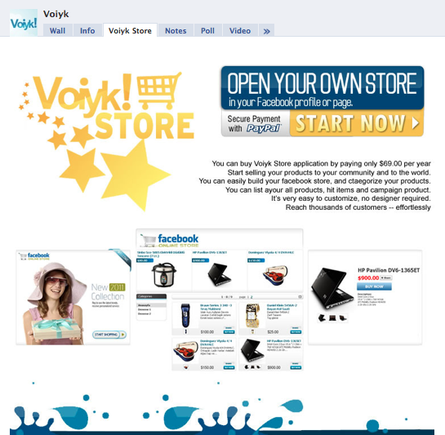
Screenshot of Voiyk’s integration with Facebook.
Voiyk provides merchants with the ability to create a Facebook fan page store.
The setup is straightforward. Merchants input some basic information, agree to the terms of use, create a welcome page, and then set up the product catalog. They can upload three images for each product and pick up to three items to include in the top showcase.
Currently, transactions are not carried out from within the fan page. Rather, purchasers are rerouted to the original source. This can be listings on Amazon, eBay and the merchants’ own ecommerce sites. And anyone who is on Facebook and “Likes” the page can browse and share products. Voiyk says it is working on a fully functional version that will allow payment and shopping cart functions within the Facebook page. Voiyk expects the rollout of that service in about a month.
Voiyk is free for the first month of use, and $69 per year after that. There are no per-item fees, transaction fees or extra charges.
Example store: Salud Cast Iron Cookware.
ShopTab
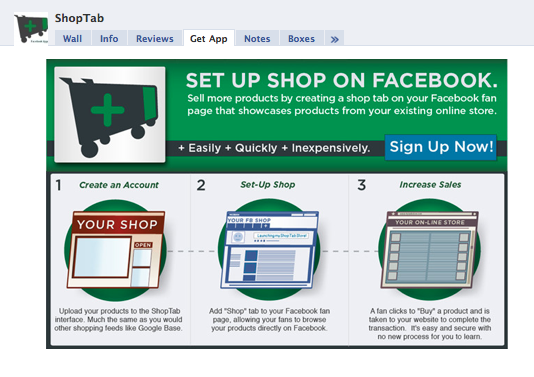
Screenshot of ShopTab’s integration with Facebook.
Similar to Voiyk, ShopTab is a Facebook application that allows business owners to sell products by creating a shopping tab on their fan pages, which showcase products from their existing online stores.
ShopTab works with most every ecommerce platform and allows a shop owner to export his or her products from an ecommerce tool and upload them to Facebook through an admin tool. Alternately, shop owners can add products individually. A few recent ShopTab business users were able to set up their 500-plus-product store within 10 minutes, according to a spokesperson from the company.
Once products have been uploaded and the ShopTab application has been added to the merchant’s fan page, the tab is instantly live with products, images and categories.
A prospective customer or fan of the retailer’s Facebook page would then be able to browse products directly and click through to the website to make the final purchase. Consumers can also share with their friends or families by posting to their Facebook wall.
ShopTab does not charge an upfront fee, nor does it take a percentage of each sale. Similar to Voiyk, users pay a flat monthly fee, starting at $10 for up to 500 products. ShopTab offers a seven-day free trial and users can cancel at any time.
Example store: Little Butterfly Kiss.
Sortprice
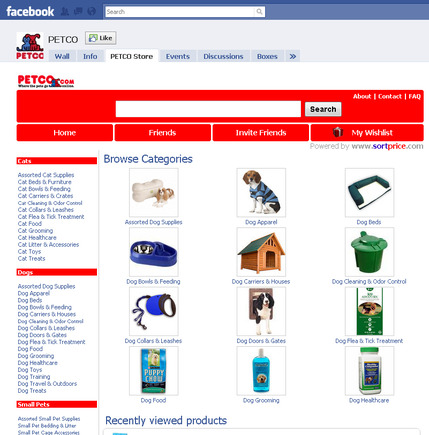
Screenshot of PetCo’s Facebook store, powered by Sortprice.com.
Sortprice is a comparison-shopping engine that also offers a store application for Facebook. The app, called Merchant Stores, was launched in 2008, making it one of the oldest. Currently, the company serves over 1,000 retailers through the application.
The stores, which are available as a free add-on to enhanced SortPrice.com merchants, enable retailers to display product listings, complete with photos, descriptions, and direct links to their own websites, on their Facebook fan pages for shoppers to browse and share. For retailers who are not Sortprice customers, fees range from $149 per month for up to 1,000 products to $400 per month for up to 50,000 products.
Retailers are able to control the look and feel of their stores, and visitors can comment on other users’ wish lists, indicate particular items that they “Like” and invite friends and family to view their wish lists or favorite products.
Example store: PetCo.
Shoutlet
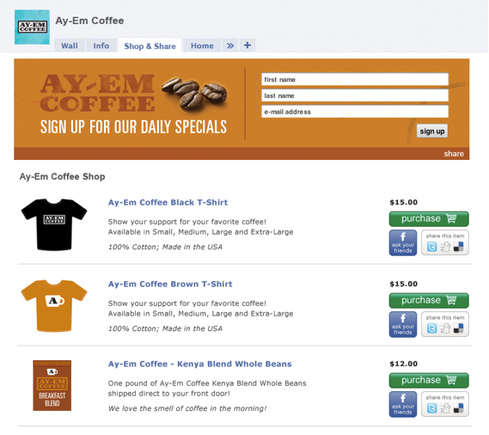
Screenshot of Ay-Em Coffee on Shop & Share app by Shoutlet.
Shoutlet, Inc. is a software development company that licenses social media marketing tools to companies seeking to reach customers through social media marketing.
Recently, the company launched its own version of a Facebook store, using “Fan Page Management” and “Shop & Share.” The applications are not only an online store, but also an extension of Shoutlet’s social media management system.
Users can create custom Facebook tabs without the need for custom development or even the knowledge of HTML. They can also drag and drop a mix of Shoutlet social media widgets and track interaction with each widget through an administrative dashboard.
The ecommerce portion of the application is called Shop & Share. It enables merchants to turn their Facebook fan page into an online store and display their entire product line within its own tab.
There is one difference between Shop & Share and the stores previously mentioned. Not only can fans share products with Facebook friends, but via more than 100 other social sharing sites as well.
The store is designed primarily for use by Shoutlet customers and the cost is not cheap. Shoutlet focuses on enterprise-level companies and annual license fees can run as high as $50,000. However, smaller merchants can make use of the Facebook application alone for anywhere from $5,000 to $10,000 per year.
Due to the newness of the application, no example store is available.
Voiyk, Shoptab, Sortprice and Shoutlet allow ecommerce merchants to upload products from their ecommerce sites. The following are two applications that provide a more limited range of services, but which deserve honorable mention nonetheless.
My Merch Store
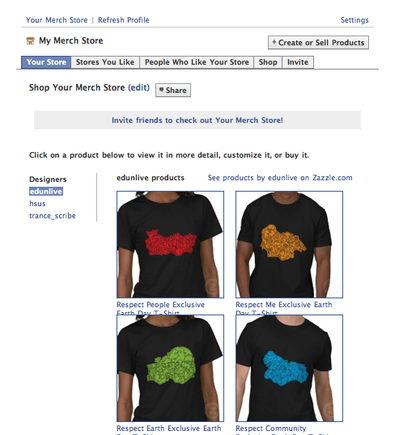
Screenshot of a My Merch Store powered by Zazzle.
My Merch Store is a Facebook ecommerce application that allows customers of Zazzle to post products on Facebook and share them with friends. Users can also spotlight other designers and showcase products from their Zazzle stores, for which they are paid a royalty when someone makes a purchase.
Zazzle, for those unfamiliar, is an online retailer that allows users to upload images and create their own merchandise such as t-shirts or posters, or buy merchandise created by other users.
Example Store: Mari Smith.
LetMeIntroduce

Screenshot of a LetMeIntroduce discount hyperlink.
Unlike those mentioned above, LetMeIntroduce is not a Facebook ecommerce application itself, but a social sharing mechanism that enables merchants to create discount coupon codes in the form of hyperlinks that can be incorporated into email campaigns, product description pages or the shopping cart checkout page.
To take advantage of the discount, customers who click the link are required to share it with either their Facebook friends or Twitter followers. Once that has been done, they get access to the coupon code, which can instantly be used. The idea is to take advantage of the viral, word-of-mouth marketing capabilities these social networks provide and drive more traffic to the merchant’s site.
Merchants pay fifty cents each time the coupon code is accessed. The merchant funds the LetMeIntroduce account using Google Checkout he or she signs up. LetMeIntroduce provides a $50 credit for each new customer. When the account is depleted, the coupon offer is no longer valid and is replaced by a message indicating that fact.
The service is fairly new and all the kinks have yet to be worked out. For example, a retailer has to manually input coupon code links into product pages, so tracking which pages have which codes could be a problem. Only the activity for each coupon is tracked through LMI’s campaign console, not the page URLs where the links reside.
In addition, there is no way to set a daily or monthly budget. Once the account runs out due to click-thru activity, the merchant has to go and manually re-fund it. On the other hand, LetMeIntroduce does not automatically debit the merchant’s credit card, so there should be no surprises when the monthly statement comes due.
Despite improvement to the system that still need to be made, LetMeIntroduce is an application that deserves attention.
Conclusion
With the exception of LetMeIntroduce, to one extent or another all of the applications listed above share very similar features. They each allow the incorporation of an online store inside a merchant’s Facebook fan page and provide the ability for products to be shared with Facebook friends and, in the case of Shoutlet’s application, with other social networks as well.
The one thing they don’t do is enable the transaction to take place within Facebook itself. That’s the subject of the next article in this series. We will look at one company that provides not merely an application, but a full-fledged shopping cart where everything, including processing the sales transaction, is done directly inside the fan page.





